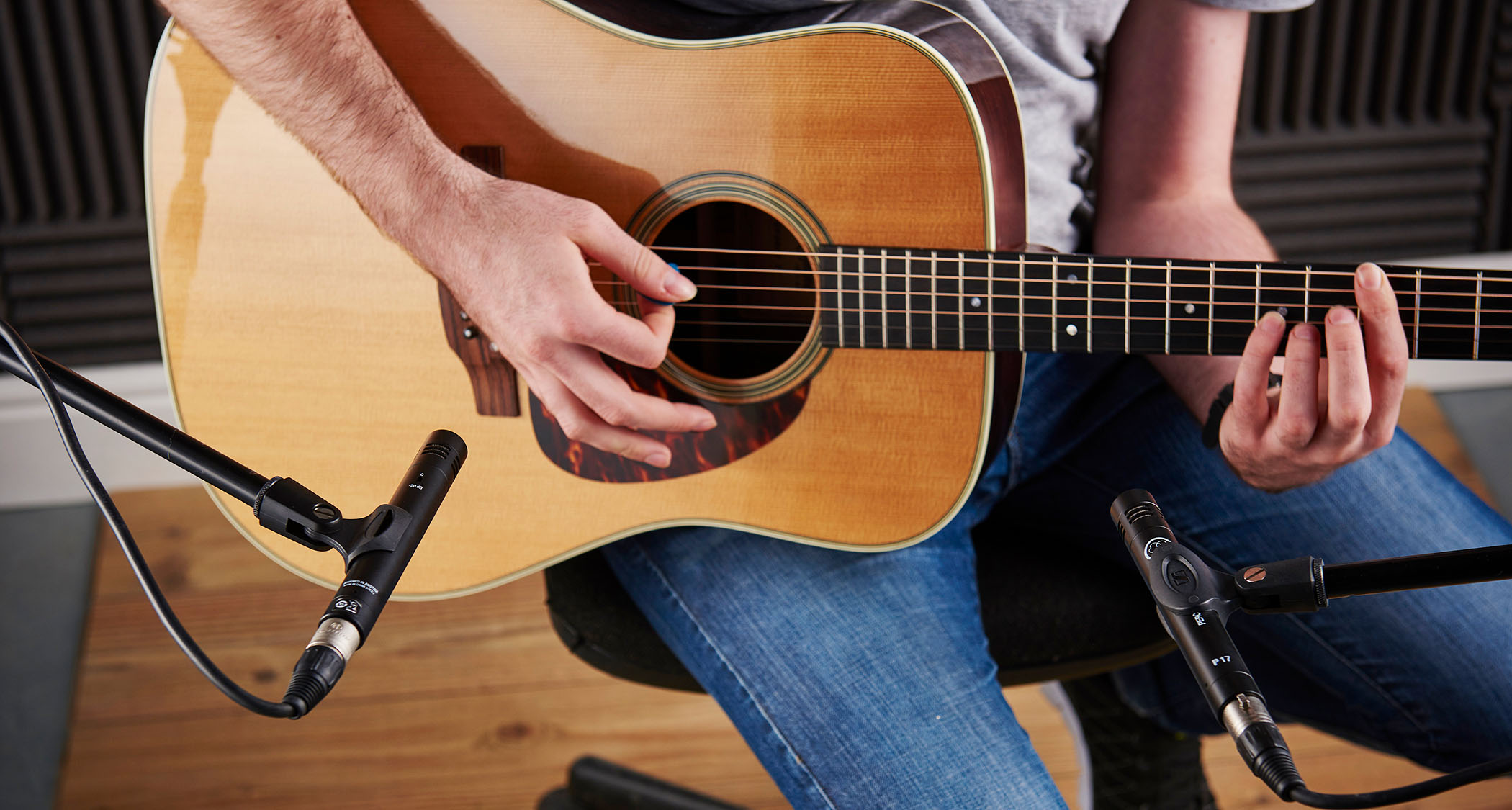Classless Act's Dane Pieper on touring with Mötley Crüe and Def Leppard, and working with Bob Rock on their debut album, Welcome to the Show
Part of a bustling new wave of classic rock, Pieper discusses the metaphorical passing of the torch, and the wisdom he learned direct from Mick Mars, Joe Elliot and Joan Jett
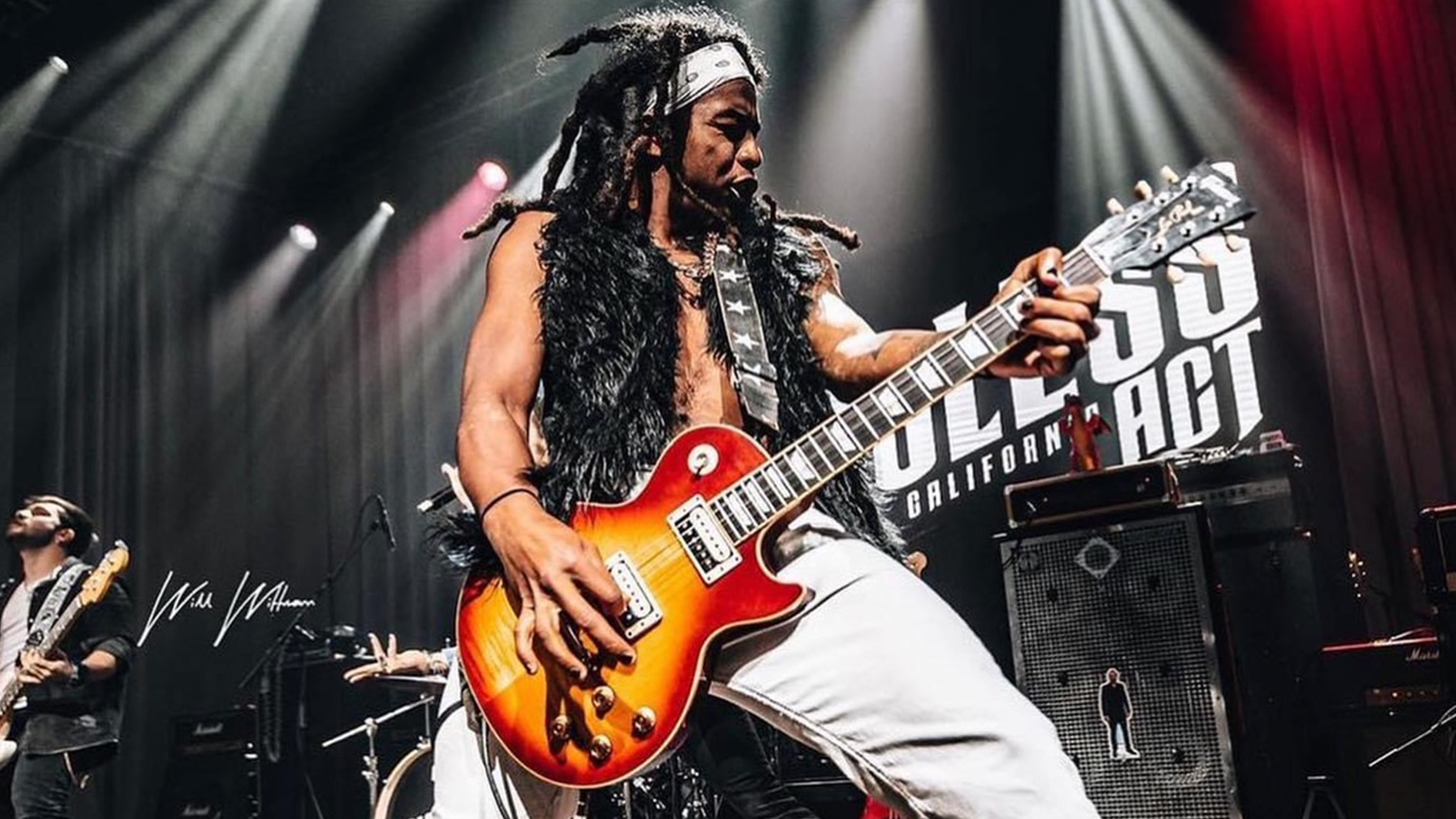
As newcomers to a burgeoning new wave of classic rock scene, Classless Act have taken the world by storm in the wake of their debut record, Welcome to the Show.
But it's not easy distinguishing yourself from the rock masses these days. With cookie-cutter bands, and pop-leaning lookalikes populating a scene defined by short attention spans, it's not hard to see how new band's stars can come crashing to Earth as quickly as they rise.
"We've never been afraid of that," quips Classless Act's guitarist, Dane Pieper. "It's never even been a thought. The idea of failure has never been in our minds. The word 'failure' isn't in this band's vocabulary.
"We know what we're capable of. We know how hard we've worked. And now that we have the opportunity to show the world what we're capable of on some big stages, we're taking it all in. I can tell you this – we aren't going to waste a single second."
In the summer of 2022, after multiple delays resulting from the COVID-19 pandemic, Classless Act received a long-awaited break. On the strength of a recommendation from Motley Crue's Tommy Lee, Classless Act were tapped as openers for the hyper-massive Stadium Tour. The timing was perfect, seeing as the group had just unleashed their molten lava-filled debut, Welcome to the Show.
"The opportunity to be a part of the Stadium Tour was lifechanging for us," Pieper continues. "We'd played in front of some cool crowds before, but this was a whole new level. Opening for Joan Jett, Poison, Mötley Crüe, and Def Leppard – bands we grew up idolizing – was something we could never have imagined.
“It's a product of hard work and a bit of luck crashing into each other. We know how lucky we are, but we also feel like we earned it. We did our best to go out there and show crowds what we were made of, and I think we killed it each time out."
All the latest guitar news, interviews, lessons, reviews, deals and more, direct to your inbox!
With the Stadium Tour now in their rearview mirror, and their debut set in stone, Classless Act is moving forward. The next phase of the band's career is two-pronged, beginning with the Acoustic EP, closely followed by the It's The Most Wonderful Tour of Year '22, which began on November 29, 2022.
During a brief respite from the controlled chaos defining his young career, Dane Pieper dialed in with Guitar World to recount Classless Act's wild ride thus far and beyond.
How meaningful was your experience on this past summer's Stadium Tour?
“Oh, man. It was incredible. It taught us a lot about being prepared and seizing opportunities when they come. Being able to perform with that stacked lineup was huge for us. Just starting out the way we are, opening for Joan Jett, Poison, Mötley Crüe, and Def Leppard was incredible for us and a huge moment for the trajectory of Classless Act.
“Most bands in our position might not have had a chance like that, but we were lucky to be able to be a part of the Stadium Tour. It's a testament to our hard work and ability to bring it the way we do.”
We see it everywhere we go, man, people are hungry, and they want to seek out new rock music
The viability of rock as a commercial entity has often been questioned of late. Do you feel the success of the Stadium Tour and bands like Classless Act have challenged that notion?
“Yes, I absolutely do. It shows that people have a hunger for rock music. By the time the tour kicked off, 1.5 million tickets were sold, and we played in sold-out stadiums. So, I think that shows that the idea that rock is dead is wrong.
“We see it everywhere we go, man, people are hungry, and they want to seek out new rock music. Seeing all these people come out the way they do, cheering for us, shows that the spirit of rock 'n' roll is alive.
“It doesn't matter who was out there; you'd see 70,000 people with their phones swaying back and forth. If that's not reassuring us that rock isn't dead, then I don't know what is.
“One of the coolest things about what's happening now is we're seeing a symbolic passing of the torch in many ways. And I think a band like Classless Act hopping on tour with the guys in Mötley Crüe and Def Leppard is a great example.”
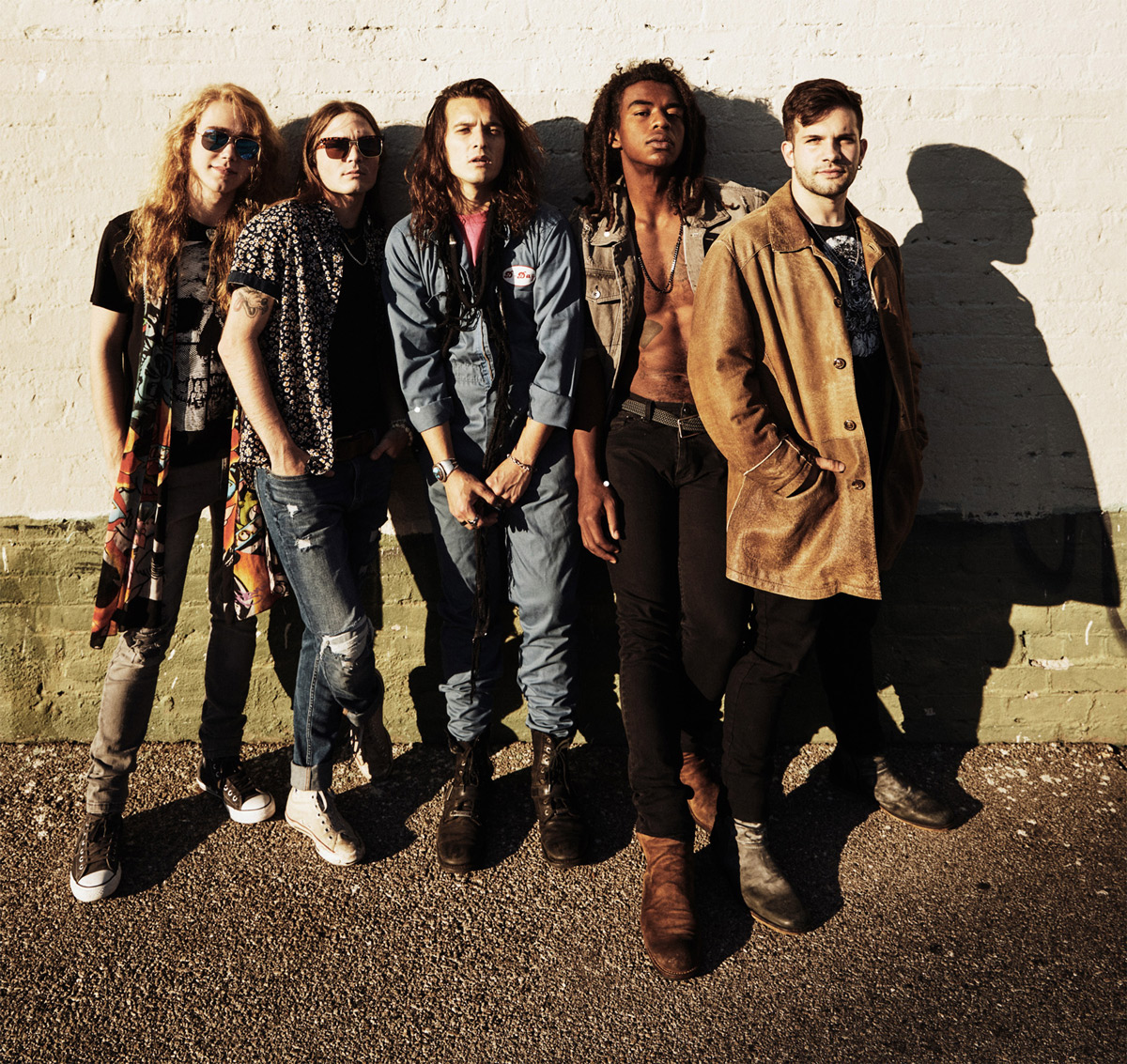
Classless Act released its debut, Welcome to the Show, this year. What was the band's collective approach?
“A lot of it was put together over Covid. We're always writing, we're very eclectic, and we're open-minded guys. We all grew up listening to bands like Led Zeppelin, Guns N' Roses, Queen, and Kiss, so we share that. But Derek [Day] loves bands like Blind Melon and indie rock, Franco [Gayvante] loves Rush and prog rock, and I love hip-hop, pop, and even some punk.
“So, all those influences open up the floodgates to experimenting with new stuff. And when working with a guy like Bob Rock – who produced our album – he was always down to try new stuff. His catchphrase was like, ‘Why not? Let's try something new. Don't be afraid.’ So, we were unafraid to try new things and sort of combine all those things we loved into one huge sound.”
I learned a lifetime's worth of things in the span of two weeks with Bob. I'll be forever grateful for that
How did Bob affect you as a guitar player?
“Well, for me, it was exciting to be able to work with Bob. All of us have listened to those records that Bob has made a million times over. So, to be there with Bob in and of itself was a huge learning experience. It's the same as being on tour; we learn every day. But I learned a ton from Bob Rock.
“He had stories of working with Mick Mars, Kirk Hammett, Richie Sambora, and all these guys, which was an education. He would go through things he used to tell those guys, how he got some of those sounds, and then reapply them to what I was doing.
“So, just the mindset that Bob has, it's something that I will carry with me as a guitarist forever. I'd be lying if I said I wasn't a different guitar player coming out of the sessions with Bob than I was going in. Bob has a lot in his arsenal, and I had to take as much from that as I could. I learned a lifetime's worth of things in the span of two weeks with Bob. I'll be forever grateful for that.”
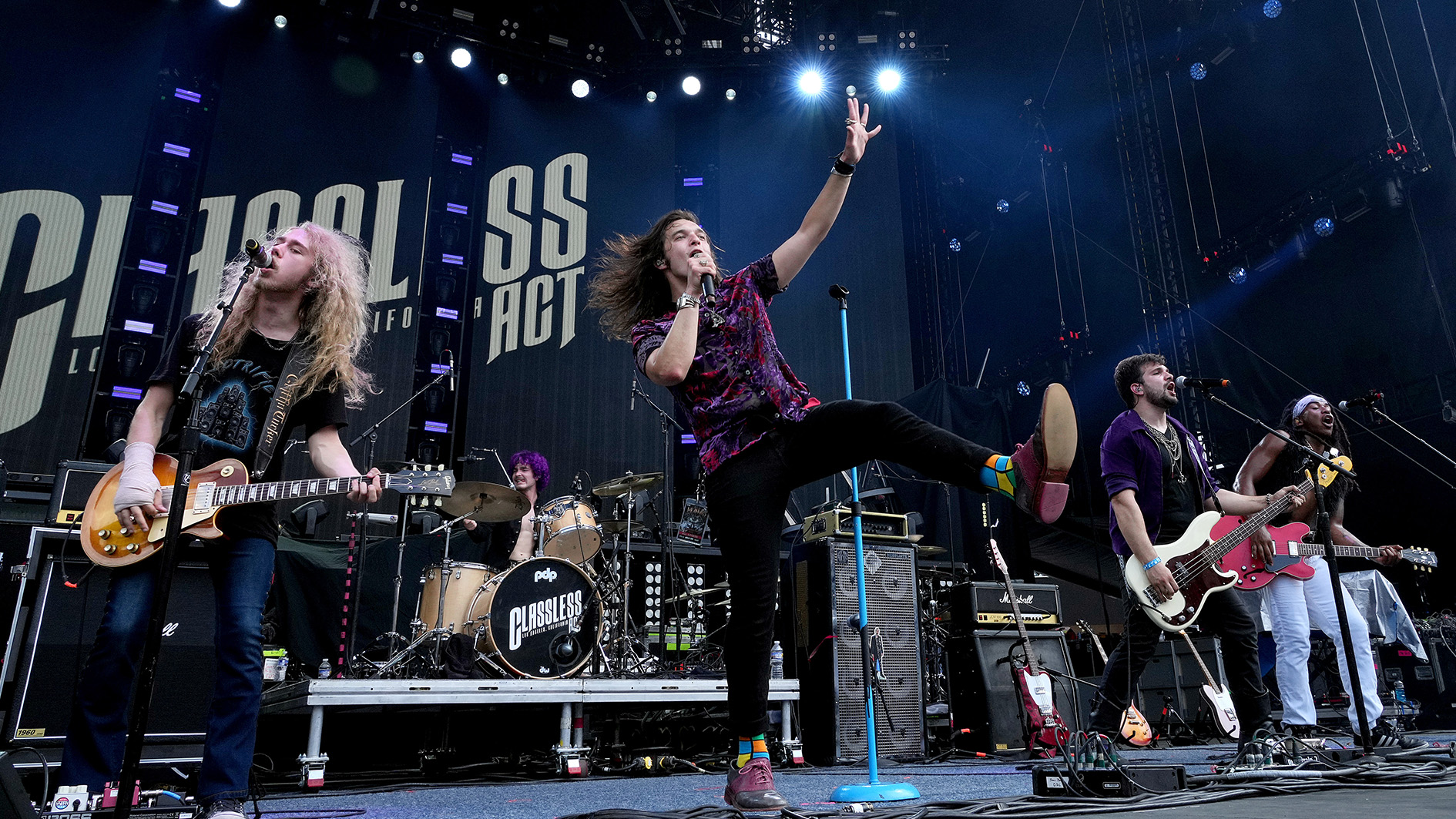
How did Vince Neil become involved with Welcome to the Show?
“We've been in the same sphere as Mötley Crüe now for a while, and we are very thankful for that. We're labelmates, and then we had the opportunity to record at Tommy Lee's home studio, and I think that had a lot to do with us getting on their radar more. And once we were, Tommy was coming down to see what we were doing more and more, and over time, he began to sit down and rock out with us, and then he'd tell us stories.
“From there, the remaining guys in Mötley Crüe started to come down, including Vince. And the way I remember it is that Derek and Vince got to talking one day with someone from our team, and it was decided that Vince would guest on Classless Act.
“The cool thing is that Vince put his own spin on it, and it's much different than it might have been without him. But he's Vince Neil, so what did we expect? [Laughs]. Mötley has been so important to us; it's a lot like how Ozzy used to help Mötley back in the '80s, and now Motley is helping Classless Act. It's a cool sort of pay-it-forward type deal with them.”
I think the ‘rock is dead’ mentality comes from the fact that people in rock music have lost that icon status that guys had in the '70s and '80s
You mentioned before that one of your influences is hip-hop. How is that reflected in your playing?
“What I love most about hip-hop is there are no rules. When it comes to vibe changes, aesthetics, and attitude, hip-hop can be whatever it wants; that's what I love most. I try and add a lot of that attitude into my playing, and my style, in both the studio and when I'm playing live.
“But it mainly comes across when we play live, and I can cut loose and be me. A lot of it harkens back to my belief that Classless Act is different than everybody else; I feel that our willingness to be individuals and embrace that is a huge part of who we are as a band.
“Going back to the idea that rock is dead, I think that a lot of that comes from the fact that people in rock music have lost that icon status that guys had in the '70s and '80s, you know? In those days, you knew who the guitar player was and who the lead singer was, but now, you don't see the distinguishing of personalities anymore.
“And in a lot of ways, hip-hop artists are the new rock stars, and the energy they communicate through the music is amazing and very similar to the way old-school rock bands did it.”
So, hip-hop influences you more through swagger than sound?
“Yeah, I'd say so. I incorporate some things from maybe Captain Kirk Douglas from The Roots or Eddie Hazel from P-Funk, and the groove speaks to me, but it's a different application in rock music. But the style and presence of hip-hop are very influential to me; it's mesmerizing in a sense.
“But I am a huge fan of hip-hop, and I'll hear things all the time that influence me, things that you'd never think a guitar player would take in. They will manifest differently when I apply them to Classless Act, but the roots of it begin in hip-hop.
“So, I try to carry that swagger and personality on stage and let it flow through our music. I let that aggression and icon status of years past come through, but in the reapplied, hip-hop sort of way. Everyone draws influences from different places, and a lot of my chord structures and even my riffs come from a place based in hip-hop music.”
The funny thing about my style is that while I love hip-hop, I also love bands like My Chemical Romance
I hear a lot of emo and pop-punk influences in your playing as well.
“That's a good observation, man. The funny thing about my style is that while I love hip-hop, I also love bands like My Chemical Romance, for example. There's a lot of that in my playing, too. The vibe and modern rock star persona of hip-hop are a huge part of what I do, but emo and pop-punk music definitely influence me.
“I grew up listening to bands like AC/DC and Guns N' Roses, and I took all of that in; that's the music that got me to pick up the guitar. But a lot of the big guitars and catchy hooks you hear are things that I picked up listening to bands like My Chemical Romance and Paramore.”
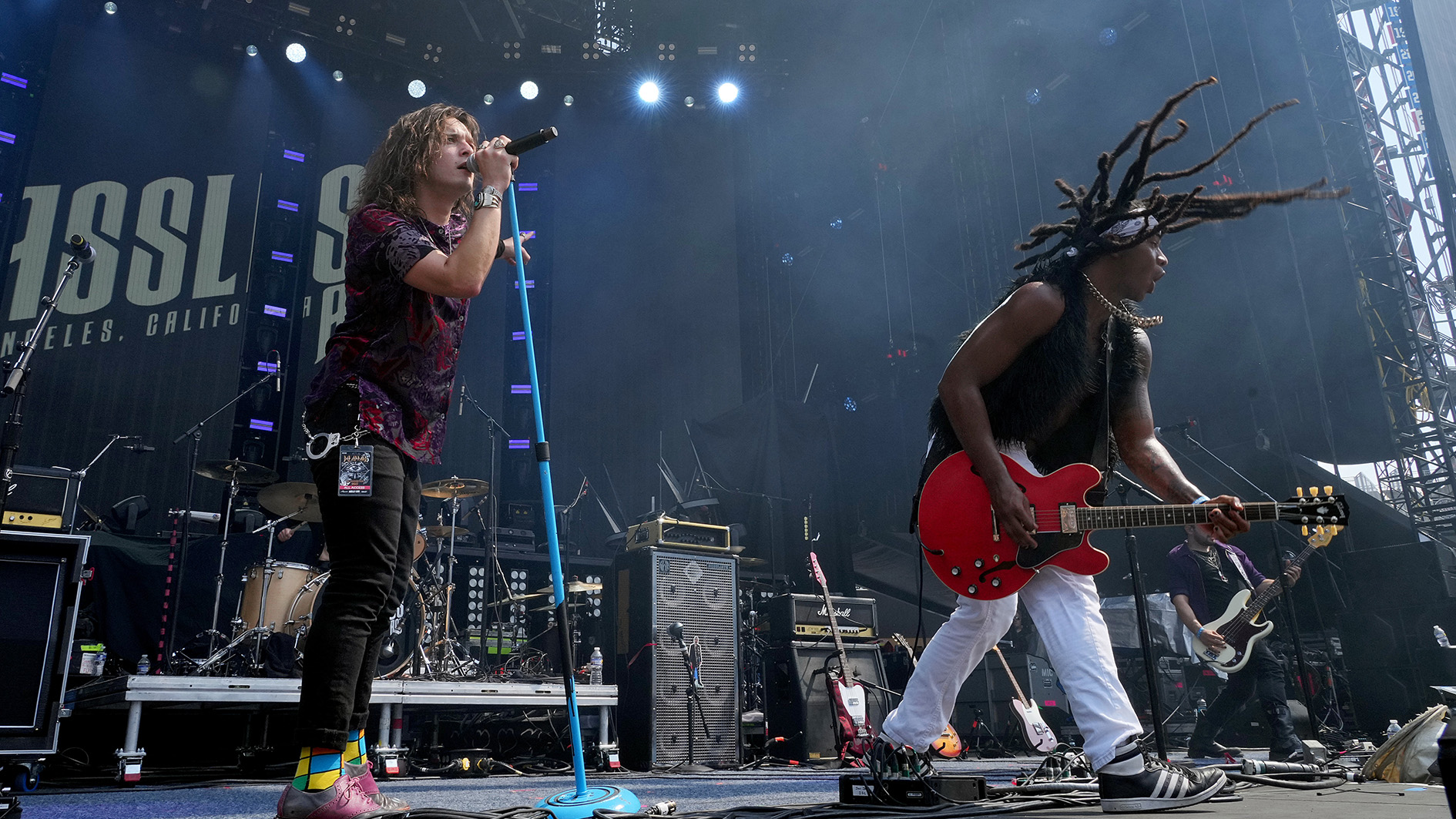
How is Classless Act managing its sudden upward trajectory and the expectations that come along with it?
“Oh, it's exciting. We all wanted the big stage. It's cheesy to say, but diamonds form under pressure. So, with that in mind, we take the stage each night, and we own it. There have been plenty of times when we've played in smaller venues, and only a handful of people were there, but that never changed our mindset.
“We always craved a bigger stage, and we have never felt that we couldn't handle it. We're not afraid of having a lot of eyes on us. In fact, we thrive in that setting. So, no one had to tell us we needed a bigger stage; we knew it from the beginning. We know how lucky we are because not every band gets the opportunities we have.
“But we've worked for it and prepared like no other. I think luck is when preparedness meets opportunity, and we now have the chance, and we aren't going to waste it.”
What's the most critical piece of advice you've received thus far?
“Well, while we were on tour with guys like Mick Mars or Joe Elliot, and then, of course, Joan Jett, all of them imparted so much wisdom. But they were also very reassuring in moments where we like, ‘Wow, this is crazy.’
These aren't people you usually come across, so we knew that the Stadium Tour was our time to take everything in
“We learned daily just by walking around and watching those people do what they do. These aren't people you usually come across, so we knew that the Stadium Tour was our time to take everything in. But it wasn't just from the artists; we also learned from the road crew and the techs.
“For example, Tom Weber is C.C. DeVille's guitar tech, and I remember that I had a 20-minute conversation with him about pickups, amps, pedals, and all the things he used to do when he was Eddie Van Halen's guitar tech. It was just me and Tom nerding out on guitar stuff, and it was the nerdiest conversation ever. [Laughs].
“But that conversation was essential, and it's an education on intangibles that you can't get anywhere else.”
What gear are you using these days?
“We keep it simple, dude. We make no secret that we love to pay homage to what we grew up loving, and for me, that's a lot of Les Pauls and the occasional Telecaster. Classless Act uses mostly Marshall amps on stage; we love the huge sound. What's better than a Marshall stack?
“But, like I said, I stick to my Les Paul for most of the riffs and things like that. I need that big, thick sound. In the studio, I use the Telecaster for overdubs and stuff like that, and I've been known to break it out live sometimes, too.”
What do Classless Act plan to do to keep your heads above water in a competitive scene?
“The answer to that is simple: work hard. The guys in this band know that the next few years will be a non-stop, runaway train. We know it won't be easy driving around in tour vans or flying here, there, and everywhere around the world. I mean, I am doing this interview in front of a Cracker Barrel right now, so you get the idea of what this lifestyle is like. [Laughs].
“This business can be a beast, and the key is not to let us swallow you up. But we're not afraid, and all of us are very hungry. We aren't going to stop, and we plan to stay in the mix and the public consciousness. It's hard work, but we're ready for it.
“We waited for a long time to make an imprint on the world. We know what it takes. It takes hard work, writing dope songs, and non-stop touring. This is the life we chose, and we're loving every minute of it.”
- Classless Act's debut album, Welcome to the Show, is out now via Better Noise Music.
Andrew Daly is an iced-coffee-addicted, oddball Telecaster-playing, alfredo pasta-loving journalist from Long Island, NY, who, in addition to being a contributing writer for Guitar World, scribes for Bass Player, Guitar Player, Guitarist, and MusicRadar. Andrew has interviewed favorites like Ace Frehley, Johnny Marr, Vito Bratta, Bruce Kulick, Joe Perry, Brad Whitford, Tom Morello, Rich Robinson, and Paul Stanley, while his all-time favorite (rhythm player), Keith Richards, continues to elude him.

